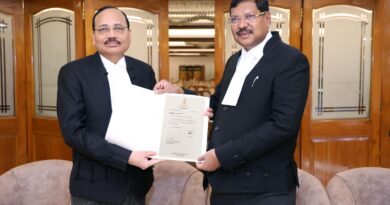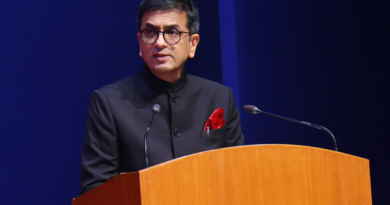Citizens Committee Report Exposes Absolute Institutional Failure In 2020 North East Delhi Violence
(Judicial Quest News Network)
In a report Citizens Committee Report blames Centre, Media and police for North East Delhi violence that rocked the nation in 2020.
The report named many Hindu nationalist Figures like Yeti Narsinghanand and Ragini Tiwari, as well as BJP political leaders such as Kapil Mishra spread hate messaging New Delhi.
The report further states that the Union Ministry failed to take effective steps to control communal violence although it controls the Delhi Police, the panel said.
The Citizen Committee report comprising former Supreme Court and High Court Judges and a former home secretary of the Union Government have authored a report, published recently has raised serious questions about the role of the news media, social media, Bharatiya Janta Party (BJP) and Hindu nationalist leaders, the Delhi police and both Union Government as well as the Government of the National Capitol Territory of Delhi, in either fomenting the North East Delhi riots of February 2020, or not doing enough to quell them.
It is titled as Uncertain Justice: A citizens Committee Report of the North east Delhi Violence of 2020, has been authored by Justice Madan B. Lokur, former Supreme Court Judge: Justice A. P Shah, former Chief Justice of Madras and Delhi High Courts and former Chairman, Law Commission of India; Justice R.S.Sodhi, former Delhi High Court Judge; Justice Anjana Prakash former Patna High Court judge and G.K Pillai, retired Indian Administrative Service officer and former Home Secretary of the Union Government. Justice Lokur chaired the committee.
Build-Up of Hate to Drive Conflict
The report sets out the context of the pre-planned Build-Up of Hate to Drive Conflict Polarization between communities, particularly anti-Muslim hate, was deliberately fuelled in the months preceding the violence. The Muslim community was grappling with deep fears of loss of citizenship, stemming from the combined effect of the Citizenship (Amendment) Act, 2019 (CAA), passed in December 2019, with potential exclusion through the National Register of Citizens process. By mid-December 2019, nationwide protests erupted against the law.
Delhi emerged as the epicentre of the anti-CAA movement with North East Delhi as the site of multiple sit-in protests. Against this background, the campaigning for the Delhi Assembly elections gathered momentum in January. The Bharatiya Janata Party (BJP) focused its election campaign on the CAA issue, within a divisive narrative framing the anti-CAA protests as anti-national and violent.
Protesters were labelled “traitors” by candidates and party leaders, such as Kapil Mishra and Anurag Thakur, at election rallies and public demonstrations. Calls for violence against the so-called “traitors”, in the form of the “goli maaro” (Shoot the traitors) slogan, were casually repeated, with no censure. The vilification of the protests and anti-Muslim hate was amplified by widely viewed television news channels and social media.
The report also points that there is an urgent need for a Commission of Inquiry a confluence of factors and state failures led to a situation in which the violence that overtook North East Delhi was neither prevented, nor once commenced, not stemmed from spreading. Hateful content against Muslims and utterances inciting violence emanated from numerous actors. They were given a free hand over a few months. There are also documented instances of police complicity in violence.
The Central and State Governments have failed to fulfil their solemn obligation to safeguard lives, property and the rule of law. More than two years since the violence, glaring issues of accountability remain unaddressed. This Committee finds that a Commission of Inquiry ought to be set up for an impartial inquiry to establish the factors that led to the violence and issues of accountability and reparations in its aftermath. We would hope such a Commission through its functioning would take steps towards restoring faith in the rule of law by getting to the truth. It is crucial that the terms of reference and the choice of the Chairperson for the proposed Commission of Inquiry assure the affected communities of its independent and effective functioning.
State Failures
State Failures All stages of the February 2020 violence – the inception, occurrence and aftermath (investigation of the violence) – are characterized by a frightening undermining of democratic values. Tragically, the communal polarization that heralded the violence has been hardened by state responses to the violence. Delhi Police The Delhi Police failed to take punitive measures against hate speeches made by political leaders and others in the run-up to February 23 or on the day itself. Allegations of police assisting mobs and participating in attacks on Muslims, anti-CAA protest sites, and mosques have been documented, in eyewitness, media and affected persons’ accounts. The Committee has obtained a limited, but credible mass of information indicating abject police failures, including apparent police complicity, of varying degrees in the violence. This requires investigation through an independent process, possibly a court-monitored investigation.
Seeking Accountability for State Failures
The report also calls out seeking accountability for State Failures considering the institutions present in Delhi, both state and central, and the ease of movement for security forces, it is a legitimate expectation that a situation of communal violence in Delhi should be averted and promptly contained. The very fact that mass violence took place over four days in a district of the nation’s capital city – the seat of both the Government of India and the Government of Delhi – indicates glaring failures of constitutional duties. Delhi Police As the principal law enforcement body of the city, it was the Delhi Police’s role to respond to visible signs of brewing violence and avert the outbreak, and later to contain it from becoming a mass violence situation. The material analyzed in the report demonstrates that the Delhi Police failed to prevent the violence even though there were enough warning signs since January 2020 indicating a tense build up. There were also instances of police complicity of varying degrees. Failure of Police to Prevent Violence The Delhi Police Act, 1978 endows the Commissioner of Police in Delhi with a range of prohibitory powers to prevent riots or breaches of public order. These include orders prohibiting the carrying of weapons and arms, and the assembly of persons as “necessary for the preservation of public order”.990 Sections 33 of the Act gives the Commissioner of Police specific powers to issue orders towards preventing a riot or “grave disturbance of peace”. Likewise, the Code of Criminal Procedure prescribes a host of preventive powers in Chapter 10, which by virtue of Section 70 of the Delhi Police Act, 1978 accrues to the Delhi Police.991 Yet, the police failed to take any preventive or punitive measures to tackle the polarized atmosphere building up in the run-up to February 23. It is documented that the police were in receipt of intelligence alerts from internal sources, of impending trouble in North East Delhi on February 23 itself.
The report states that while the EC did issue some action in some of the cases, it wasn’t of adequate measure. “The Commission stopped short of ordering registration of FIR’s against these political leaders for hate speech. With the Commission failing to initiate criminal prosecution, the malaise of hate speech refusing electoral campaign is likely to spread further,” the report states.
The report also highlights the ineffectual attitude of Delhi CM as well as Delhi Government Government of Delhi the Committee finds that the Government of Delhi did precious little during this entire time to mediate between the communities, even with the warning signs. While the Delhi Government’s ability to control violence is limited as the administrative control over the Delhi Police remains with the Central Government; it failed to exert the role of civic mediation, and statesmanship, to calm the situation. The government, and its popular Chief Minister, voted in through a landslide victory only a few days before, displayed an entirely ineffectual, seemingly helpless stance rather than doing all it could on the back of its emphatic mandate. Additionally, the Delhi Government, which is directly responsible for ensuring relief and compensation, failed to discharge this role in a meaningful way. Government agencies failed to extend effective relief during the days of violence. The lack of adequate relief camps and the sudden closure of the Eidgah camp would have left many vulnerable people with no access to shelter. It was for the Delhi Government to ensure expeditious payment of compensation for harm and losses suffered by the victims of the violence. However, the approval and delivery of compensation has been riddled with difficulties and delay. Where decisions have been made, there are concerning patterns of compensation amounts not matching the harm suffered, or compensation being rejected without adequate basis.
The report also questions the use of UAPA on activists and others, and said that the committee “has found no material produced through the current investigation that supports the allegation that the said alleged criminal acts constitutes a terrorists act.
It is a very ill-conceived and unsubstantial application of UAPA to the present case not merely stretching the law, but perversion of the law and appears targeted.
Several activist including Umar Khalid, Sharjeel Imam,Khalid Saifi and others have been incarcerated for over two years in connection with the Delhi riots.
According to the report the ministry of Home affairs “The response of the Government of India, namely Ministry of Home affairs (MHA), was wholly inadequate, despite having command over both Delhi Police and the central paramilitary forces, the MHA failed to take effective steps to stem the spread of communal violence. Repeated assurances of February 24 and 25 by police top brass and government officials that the situation was under control did not match the visibility of violence on the ground.
The authorities have done a “precious little “during this time to “mediate between the communities, even with the sharp warning signs in the lead up to February 23”. The committee feels that it failed to exert the role of civic mediation and statesmanship to calm the situation. Further, the Delhi Government has failed to ensure timely and adequate relief and compensation to those affected by violence. Approval of the compensation by the government and the Claims Commission riddled with the delay
The report draws from the media reports to say that the process to claim compensation was difficult and was further impeded by delays.
On the investigation into the violence, the committee has said that it appears skewed since it does not examine the connections between the –––outbreaks of the violence and hate speeches. “It, incongruously, subjects anti-CAA protestors to a UAPA prosecution for allegedly committing violence which ultimately targeted Muslims




